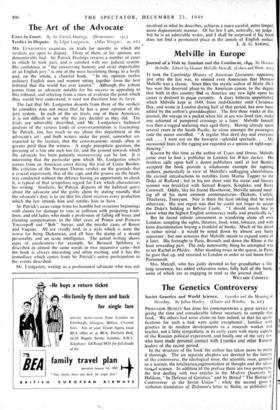Melville in Europe IT took the Cambridge History of American
Literature, appearing just after the last war, to remind even Americans that Herman Melville was a classic. Since then the mystic author of Molly Dick has won his deserved place-in the American canon, to the degree
that both in this country irnd in America any new light upon his career is destined to pique curiosity. A diary hitherto unpublished which Melville kept in 1849, from mid-October until' Christmas Day, and wrote in London during half of that period, has now been edited by the author's granddaughter. The first three weeks of this journal, the voyage in a packet when life at sea was lived raw, make one ashamed of pampered crossings in a liner: Melville himself
was then a rugged seafaring man aged thirty. Having already spent several years in the South Pacific, he alone amongst the passenger; rode the ocean unruffled. " A regular blue devil day and everyone sick . . . I went out on the bowsprit—splendid spectacle. . . My occasional feats in the rigging are regarded as a species of tight-rope- dancing."
Known by this time as the author of Typee and Omoo. Melville came over to find a publisher in London for White Jacket. His fruitless calls upon half a dozen publishers until at last Bentley accepted the book provide a wholesome example for aspiring authors, particularly in view of Melville's unflagging cheerfulness. He carried introductions to notables from Martin Tupper to the Duke of Rutland ; but in his too short visit his social and literary summit was breakfast with Samuel Rogers, Kinglake, and Barry Cornwall. Oddly, like his friend Hawthorne, Melville missed meet- ing all of his more eminent contemporaries—Dickens, Carlyle, Thackeray, Tennyson. Nor is there the least inkling that he tried otherwise. His one regret was that he could not linger to accept the Duke's bidding to Belvoir Castle. " I should much like to know what the highest English aristocracy really and practically is."
But he found infinite amusement in wandering alone all over London, sampling the sights, theatres, food, wine, tobacco, and with
keen discrimination buying a trunkful of books. Much of his detail is rather trivial ; it would be noted down by almost any hasty sojourner ; but one surmises that Melville meant to expand some of it later. His fortnight in Paris, Brussels and down the Rhine is the least rewarding part. The only noteworthy thing he attempted was to see Rachel in Phedre. After standing twice in the queue, in Paris, he gave that up, and returned to London in order to sail home from Portsmouth.
Mrs. Metcalf, who has justly devoted to her grandfather a life long reverence, has added exhaustive notes, fully half of the book. some of which are as engaging to read as the journal itself.
WILLARD CONNELY.


































 Previous page
Previous page